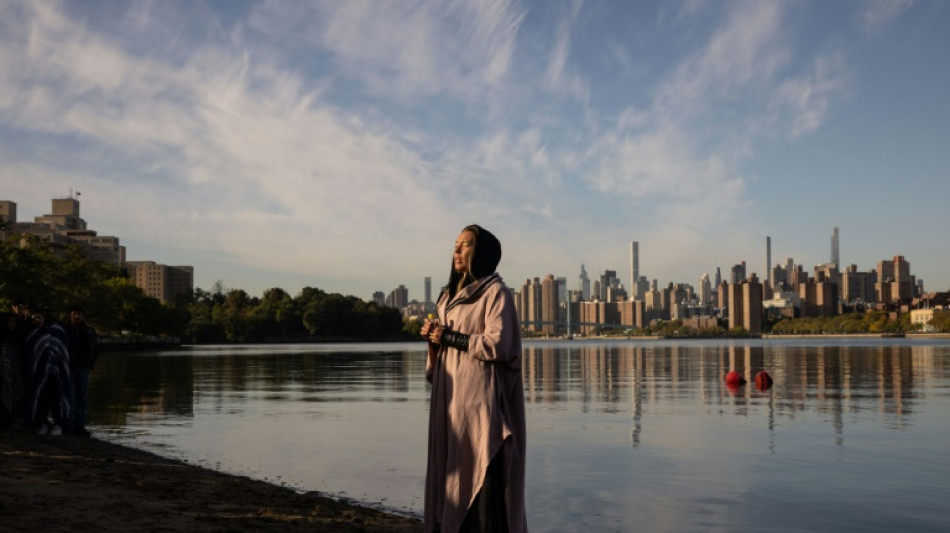
-
 Laos hostel staff detained after backpackers' deaths
Laos hostel staff detained after backpackers' deaths
-
Hong Kong LGBTQ advocate wins posthumous legal victory

-
 Ukraine says cannot meet landmine destruction pledge due to Russia invasion
Ukraine says cannot meet landmine destruction pledge due to Russia invasion
-
Rod Stewart to play Glastonbury legends slot

-
 Winter rains pile misery on war-torn Gaza's displaced
Winter rains pile misery on war-torn Gaza's displaced
-
'Taiwan also has baseball': jubilant fans celebrate historic win

-
 Russia pummels Ukraine with 'record' drone barrage
Russia pummels Ukraine with 'record' drone barrage
-
Paul Pogba blackmail trial set to open in Paris

-
 China's Huawei unveils 'milestone' smartphone with homegrown OS
China's Huawei unveils 'milestone' smartphone with homegrown OS
-
Landmine victims gather to protest US decision to supply Ukraine

-
 Indian rival royal factions clash outside palace
Indian rival royal factions clash outside palace
-
Equity markets retreat, dollar gains as Trump fires tariff warning

-
 Manga adaptation 'Drops of God' nets International Emmy Award
Manga adaptation 'Drops of God' nets International Emmy Award
-
China's Huawei launches 'milestone' smartphone with homegrown OS

-
 Philippine VP denies assassination plot against Marcos
Philippine VP denies assassination plot against Marcos
-
Four Pakistan security forces killed as ex-PM Khan supporters flood capital

-
 Hong Kong's legal battles over LGBTQ rights: key dates
Hong Kong's legal battles over LGBTQ rights: key dates
-
US lawmakers warn Hong Kong becoming financial crime hub

-
 Compressed natural gas vehicles gain slow momentum in Nigeria
Compressed natural gas vehicles gain slow momentum in Nigeria
-
As Arctic climate warms, even Santa runs short of snow

-
 Plastic pollution talks: the key sticking points
Plastic pollution talks: the key sticking points
-
Indonesia rejects Apple's $100 million investment offer

-
 Pakistan police fire tear gas, rubber bullets at ex-PM Khan supporters
Pakistan police fire tear gas, rubber bullets at ex-PM Khan supporters
-
Ronaldo double takes Al Nassr to brink of AFC Champions League last 16

-
 Pakistan police fire tear gas, rubber bullets at pro-Khan supporters
Pakistan police fire tear gas, rubber bullets at pro-Khan supporters
-
Hong Kong same-sex couples win housing, inheritance rights

-
 Indonesia digs out as flooding, landslide death toll hits 20
Indonesia digs out as flooding, landslide death toll hits 20
-
Liverpool's old guard thriving despite uncertain futures

-
 Mbappe takes reins for Real Madrid in Liverpool clash
Mbappe takes reins for Real Madrid in Liverpool clash
-
As AI gets real, slow and steady wins the race

-
 China's Huawei to launch 'milestone' smartphone with homegrown OS
China's Huawei to launch 'milestone' smartphone with homegrown OS
-
Porzingis and Morant make triumphant NBA returns

-
 Hong Kong top court affirms housing, inheritance rights for same-sex couples
Hong Kong top court affirms housing, inheritance rights for same-sex couples
-
Philippines, China clashes trigger money-making disinformation

-
 Most Asian markets drop, dollar gains as Trump fires tariff warning
Most Asian markets drop, dollar gains as Trump fires tariff warning
-
England 'not quivering' ahead of New Zealand Test challenge

-
 Bethell to bat at three on England Test debut against New Zealand
Bethell to bat at three on England Test debut against New Zealand
-
Trump vows big tariffs on Mexico, Canada and China

-
 New Zealand and England to play for Crowe-Thorpe Trophy
New Zealand and England to play for Crowe-Thorpe Trophy
-
Scheffler, Schauffele and McIlroy up for PGA Player of the Year

-
 Trump to face less internal pushback in new term: ex-commerce chief
Trump to face less internal pushback in new term: ex-commerce chief
-
Extreme weather threatens Canada's hydropower future

-
 More than 34,000 register as candidates for Mexico judges' election
More than 34,000 register as candidates for Mexico judges' election
-
Australia ban cycling's Richardson for life after UK defection

-
 Internal displacement in Africa triples in 15 years: monitor
Internal displacement in Africa triples in 15 years: monitor
-
'Remarkable global progress': HIV cases and deaths declining

-
 Social media firms raise 'serious concerns' over Australian U-16 ban
Social media firms raise 'serious concerns' over Australian U-16 ban
-
Tiger to skip Hero World Challenge after back surgery

-
 MLB shifts six 2025 Rays games to avoid weather issues
MLB shifts six 2025 Rays games to avoid weather issues
-
US women's keeper Naeher retiring after Europe matches


Native Americans fear loss of Indigenous languages in US
As Native Americans this week celebrated Indigenous Peoples Day -- the holiday increasingly recognized in the United States in lieu of "Columbus Day" -- members of the continent's hundreds of tribes shared a common concern: the ongoing extinction of their ancestral languages.
The United States is currently home to 6.8 million Native Americans, or two percent of the population.
Members of the Shinnecock Nation on Long Island gathered for the sunrise to honor this week's holiday, which has been adopted by more than a dozen US states and cities amid the growing view that Italian explorer Christopher Columbus brought little more than genocide and colonization to the Americas in 1492.
And further north on the Atlantic Coast, people of the Americas and Caribbean ate together as they held discussions, danced and sang.
But while their ancestors saw their communities decimated by centuries of colonization, descendants today fear their culture and languages could be swallowed up in a single generation by English and Spanish.
Decrying "the invasion of the 21st century," Anthony Sean Stanton, the 64-year-old head of the Narragansett tribe, said his people must "hang onto what we got because once it's gone, it's gone forever."
Further west, the Lakota -- a prominent subculture of the Sioux, located primarily in North and South Dakota -- also fear the extinction of their language, currently spoken by 1,500 people, compared to 5,000 speakers two decades ago.
For many communities, including the Lakota, the generational transmission of languages halted around the mid-1980s, said linguist and activist Wilhelm Meya, who serves as president of The Language Conservancy (TLC) in Indiana.
There is "a very small window of opportunity to try to bring the language back before the last speakers of this language pass on. And this is a story that's replicated across hundreds of communities in North America," he said.
"We're in the forefront of trying to prevent this total collapse of Indigenous languages in North America."
- 'Hungry' for language -
According to TLC, some 2,900 languages of the approximately 7,000 spoken worldwide are endangered.
At this rate, the organization says, nearly 90 percent of all languages could become extinct in the next 100 years.
Native American languages are dying out at an even faster rate, according to the non-profit, with more than 200 already eradicated.
The best preservation strategy is to teach these languages in schools, says Meya, who notes that the federal government finally allowed communities to take up the practice in the early 1970s.
He also urges the development of other materials in the ancestral languages, including translating cartoon series and documentary films, as well as creating dictionaries and assisting with teacher trainings.
"Anything we can do to reach the young people who are very, very hungry for their language," Meya said. "They want their culture, they want their identity."
- 'Part of who I am' -
Miya Peters, an 18-year-old member of the Wampanoag tribe along the northeastern US coast, is one such example. She learns her language as part of a partnership between her tribal school and public school.
"I love it. It is hard. It's very different," she said. "But it's part of who I am. So it always just gives me that encouragement to just keep going and bring it back."
Meya and his colleague Travis Condon aim to continue the work of Kevin Locke, an ardent defender of his Lakota language and culture.
The 68-year-old flautist, hoop dancer and storyteller died suddenly on September 30.
"He was definitely a warrior for his tribe, you know, an ambassador for mankind," Meya said.
The linguist emphasized the need for federal investment in language preservation.
"It took the federal government 100 years and billions of dollars to eradicate Native American languages through the boarding school system," he said. "And it's gonna take equal amount of resources to bring back Indigenous languages in North America."
"It's much, much more difficult to create than it is to destroy."
D.Schneider--BTB


